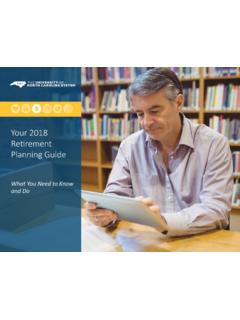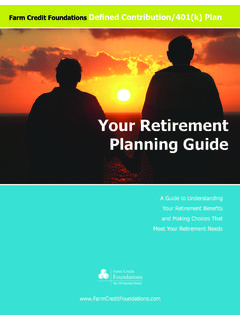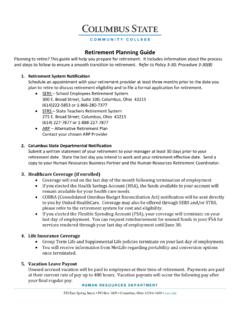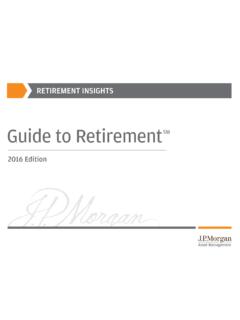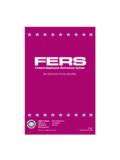Transcription of 46-4110-ARE YOU PLANNING TO RETIRE BROCHURE-E
1 retirement PLANNING Y O U R G U I D E. Choices today can lead to freedom tomorrow What's inside Introduction ..1. Lifestyle PLANNING ..2. Potential sources of retirement income ..5. Life insurance ..6. Maximizing after-tax income Maximize Minimize Estate PLANNING ..8. Introduction Whether you're saving for retirement or approaching it, ask yourself whether you've fully explored all aspects of your retirement income. For many it can be a difficult topic. Everyone will have unique needs and goals for their retirement . Even the definition of retirement has evolved over the years. Fewer Canadians today are retiring at 65; some RETIRE earlier while others continue to work beyond that age. An important consideration is that the numbers of years spent in retirement is growing. The average life expectancy of someone who reaches retirement today (age 65) is 81 for men and 86 for women, with 50 per cent of Canadians living even longer!
2 (Source: Statistics Canada, 2003). When developing your retirement plan, consider using age 91. for men and 94 for women. Years Working years Parent 16 49 17. You 22 38 ? Child 26 29 ? 0 20 40 60 80 100. Age School Work retirement Your financial security and investment representative has the expertise to help you plan your retirement , including lifestyle choices, income needs and estate goals. 1. Lifestyle PLANNING what is retirement ? Baby boomers are those born between 1945 and 1966, with the peak occurring in retirement means 1959. They represent a significant segment of the population it's estimated baby many different things boomers represent one-third of the Canadian population. Most are thinking about retiring and some already have. to different people. While nearly 70 per cent In a recent study, baby boomers thought retirement would mean: of study participants Time to pursue interests 71 per cent and hobbies view retirement as leisure, travelling and Time of leisure 63 per cent other interests, nearly Chance to do travelling 57 per cent 80 per cent of baby couldn't do when younger boomers think they Time to indulge yourself 48 per cent might be working after age 65.
3 0 10 20 30 40 50 60 70 80. Source: 2003 AARP survey of baby boomers' expectations for retirement Understanding how you How do you envision your retirement ? imagine retirement and There are eight common factors that contribute to a successful retirement . how you live life today 1. Positive view on aging and life transitions: How you've handled other life is the first step to transitions can hint at what transitioning to retirement might be like. lifestyle PLANNING . 2. Strong vision and values: What is your primary aim in life that which gives you a sense of purpose and defines "fulfillment.". 3. Healthy aging: Poor health can prevent you from enjoying your retirement . 4. Positive view of work : Seeing work as a chore rather than rewarding can create hurdles when it's time to RETIRE . 5. Nurturing family relationships: Researchers have found people in satisfying personal relationships have fewer illnesses and higher levels of good overall health.
4 6. Supportive social network: Good relationships offer a number of emotional benefits. 7. Meaningful and fulfilling activities: There's a difference between activities that fill time and fulfilling activities. Only you know the difference. 8. Financial comfort: You'll need sufficient financial resources to fund a quality retirement . Source: 2. Getting started a) Consider your lifestyle Many Canadians continue to work past age 65 because they may not have considered an alternative or prefer a semi-retired lifestyle. Some continue because they haven't adequately prepared financially. retirement can cause stress or even depression for retirees who suddenly find themselves no longer working, either by choice or as a result of forced retirement . Scenario Consideration Imagine what your retirement retirement PLANNING is not just about would look like if money were financial health. Do you have a plan in no object. How would you spend place that also takes your social and your time?
5 What would fill emotional health into account? your day? For example, if today you enjoy taking courses, If you're a business owner, how Giving up a business can be gardening and travelling, will your lifestyle change when a considerable loss. Being an owner there's a good chance you decide to RETIRE or sell provides a sense of pride and accomplishment. In retirement , you'll want to enjoy the business? what will give you a sense of pride those activities during and accomplishment? retirement . Most people don't dramatically If you've worked at a company Suddenly losing the daily routine of change their lifestyle for a number of years, doing a work can have significant consequences at retirement . job you love, what impact will to your emotional well-being if there that have when you're no is no plan to replace it. What will Do you have a financial longer working? motivate you in retirement ? security plan in place to accommodate those If you're not sure how you would respond to these scenarios, it may be time activities once to consider lifestyle PLANNING an equally important piece of the retirement you RETIRE ?
6 PLANNING puzzle. Lifestyle PLANNING means identifying how you want to spend your retirement years what specific activities you want to engage in and developing a financial security plan to support it. One way to start your lifestyle PLANNING process is to create a list of activities you enjoy today. Decide if you want to continue those activities in retirement or add new ones. 3. b) Calculate income needs Once you've started a list, next attach a monthly or yearly expense to each. Discuss this starting list with your financial security and investment representative. He or she can help you determine if your financial security plan can support the lifestyle plan, or whether you need to adjust them accordingly. Activity Estimated cost 1. $. 2. $. 3. $. 4. $. Another common way to calculate total income needs at retirement is to multiply your pre- retirement (after-tax) income by 70 per cent. This method can give you Consider asking your a ballpark estimate, but does not account for lifestyle choices.
7 So it's important to financial security remember this method may not capture all your income needs. For example, golfing 12 times a year may cost $600. But when retired, golfing three times and investment each week from June to October may cost $3,000, or more. representative for the income needs c) retirement spending analysis worksheet. How you plan to spend your money in retirement is aligned with your lifestyle goals. However, there are some generalized income needs during different phases This can help you of retirement . For this, let's assume a retirement age of 60. consider common expenses and what Early retirement years income you might Most retirees require income in the first 10-20 years to support a more active expect to need lifestyle. The majority of your activities will revolve around the specific lifestyle choices you have made (travel, outdoor activities, social clubs, continuing during retirement . education, etc.
8 There may be other important expenses to consider, such as caring for a parent. Be sure to include these in your calculations. Later retirement years In later years of retirement (80 and older), income needs tend to shift to support increased healthcare costs, maybe even in-home care, etc. Having a sound lifestyle plan should account for both increased healthcare and maintaining the activities you enjoy. As you age, you may need supportive living arrangements, which can be very costly, particularly for a private residence. 4. Estate PLANNING We'll discuss estate PLANNING in more detail later. But for the purposes of lifestyle PLANNING , it's important to consider your estate at this early PLANNING stage. Your lifestyle ideas will be reflected in your financial security plan to help ensure you have the financial means to support it when you RETIRE . But it should also reflect your goals, if any, for leaving something behind to family, friends, a favourite charity, etc.
9 If your goal is to leave a specific amount to a charity, for example, then your financial security plan should reflect this goal. d) Determine potential sources of retirement income As Canadians, we have a number of income options available at retirement , some sponsored by the government, others by employers, with personal savings an important factor. Below is a summary of the different sources of retirement income that may be available to you. It's important to remember that registered income plans are governed by pension legislation both federally and provincially. So depending on your province of residency, certain restrictions may apply. For a detailed description Registered retirement savings plans (RRSPs)+. of each, ask your financial +. Registered retirement income funds (RRIFs) security advisor for the +. Life income funds (LIFs) retirement product guide Locked-in retirement income funds (LRIFs)+ entitled Freedom Funds: helping you live your Company pensions retirement dreams.
10 Old Age Security (OAS). Canada Pension Plan (CPP) or Quebec Pension Plan (QPP). Non-registered accounts Sale of a business Consolidating these potential sources of retirement income can be extremely complicated, particularly when considering how they fit into your overall financial security plan. It's important you discuss all the different sources of your retirement income with your financial security and investment representative. He or she has experience helping people align income sources to be tax efficient and can help you determine today if you'll have enough for tomorrow. +. These are tax-deferred accounts governed by legislation. Inside these types of accounts one can hold a variety of different investments, which may include mutual funds, segregated funds, guaranteed investments, etc. 5. Life insurance If you have maximized RRSP and pension plan contributions, have invested When you consider your significantly in non-registered, fixed-income investments and are concerned that savings goals, remember these plans will not provide enough income to maintain your desired lifestyle there are a number of during retirement , permanent cash value life insurance can help diversify your expenses pre-retirees overall financial security plan.
